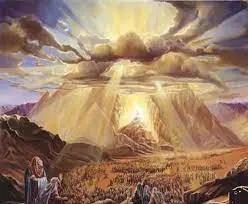“One of the most famous phrases in the Torah makes its appearance in this week’s parsha. It has often been used to characterise Jewish faith as a whole. It consists of just two words: na’aseh venishma, literally, ‘we will do and we will hear’ (Ex. 24:7). What does this mean and why does it matter?
…the Israelites are described by the Torah as ratifying the covenant three times: once before they heard the commandments and twice afterward. There is a fascinating difference between the way the Torah describes the first two of these responses and the third:
The first two responses, which refer only to action (na’aseh), are given unanimously. The people respond ‘together.’ They do so ‘with one voice.’ The third, which refers not only to doing but also to hearing (nishma), involves no unanimity. ‘Hearing” here means many things: listening, paying attention, understanding, absorbing, internalising, responding, and obeying. It refers, in other words, to the spiritual, inward dimension of Judaism.
From this, an important consequence follows. Judaism is a community of doing rather than of ‘hearing.’ There is an authoritative code of Jewish law. When it comes to halachah, the way of Jewish doing, we seek consensus.
By contrast, though there are undoubtedly principles of Jewish faith, when it comes to spirituality there is no single normative Jewish approach. Judaism has had its priests and prophets, its rationalists and mystics, its philosophers and poets. …The Torah contains law and narrative, history and mystic vision, ritual and prayer. There are norms about how to act as Jews. But there are few about how to think and feel as Jews.
We experience God in different ways. Some find Him in nature,… Others find Him in interpersonal emotion,… Some find God in the prophetic call… Others find Him in study, …Yet others find Him in prayer…
There are those who find God in joy, dancing and singing… Others – or the same people at different points in their life – find Him in the depths, in tears and remorse, and a broken heart.
…
There is a normative way of performing the holy deed, but there are many ways of hearing the holy voice, encountering the sacred presence… We can find God by seeking Him, but sometimes He finds us when we least expect it.
That is the difference between na’aseh and nishma. We do the Godly deed ‘together.’ We respond to His commands ‘with one voice.’ But we hear God’s presence in many ways, for though God is one, we are all different, and we encounter Him each in our own way.

